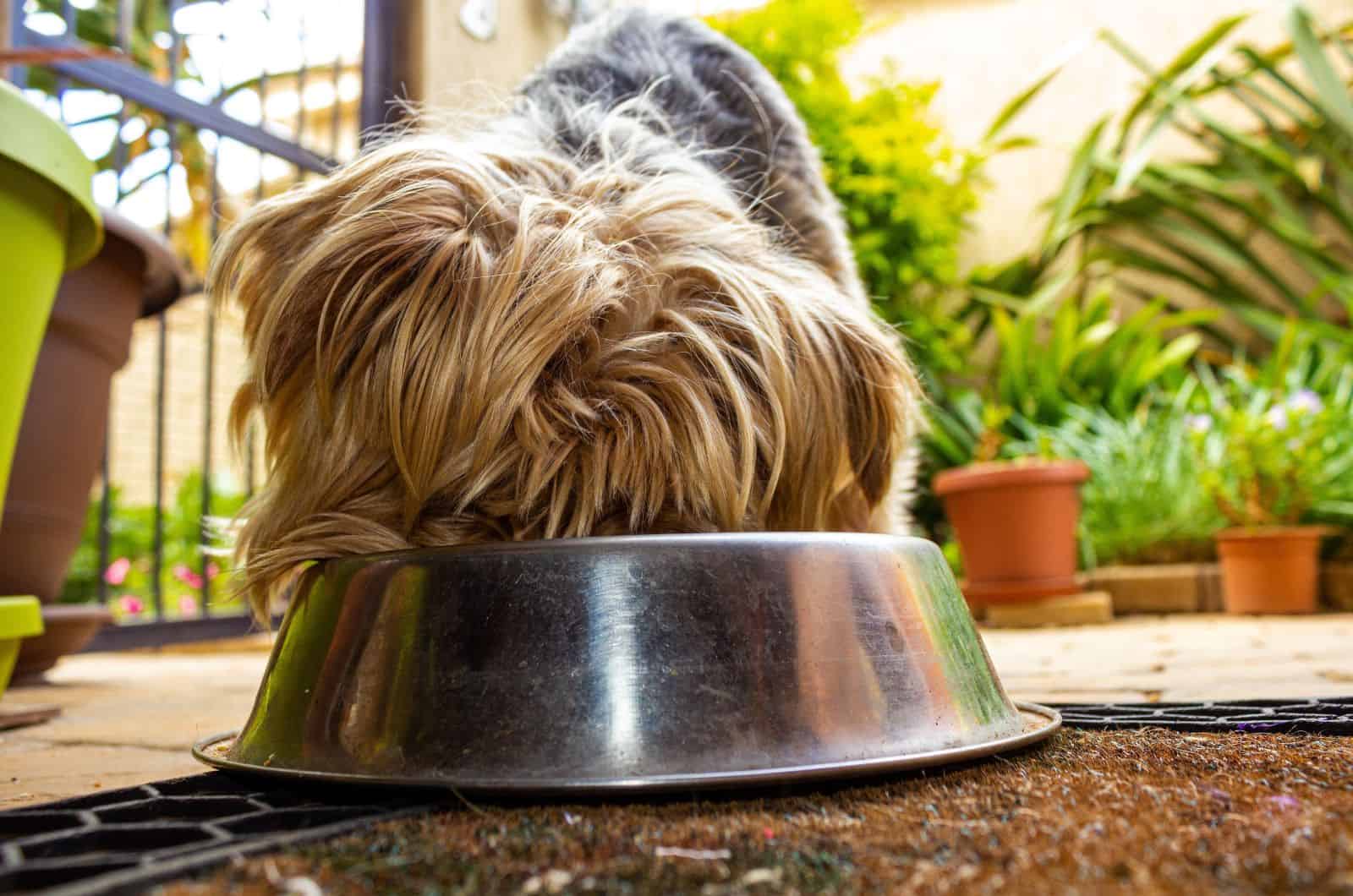Yorkshire Terriers are an adorable dog breed that used to be a proper working dog before becoming the ever-loved house pet that he’s known to be today.
While they aren’t the most high energy breed, they do have special nutritional needs that have to be met which will be shown through a Yorkie feeding chart.
These Yorkie feeding charts display the needs of an average Yorkshire Terrier throughout all of its life stages, helping you figure out the right amount of food needed and to better set up an adequate feeding schedule.
However, not every Yorkie is average, so it’s best to coordinate your dog’s recommended daily intake with his veterinarian or a certified pet nutritionist to curate a plan more suitable for your canine companion.
But, before that, I’d love to run you through some of the basics here that are worth knowing to keep your dog as fit and as healthy as you possibly can without a lot of outside assistance.
Read on to find out what the adequate feeding amounts for Yorkshire Terriers are from when he’s just a little pup all the way to being an adult dog as well as answers to some of the more common questions asked regarding the topic.
The Yorkie Feeding Chart: What It All Looks Like
[table id=548 /]
As you can see, it starts off small and gradually increases, but it’s worth noting that this is all based on using high-quality dry dog food as a measure.
Since all dog food isn’t the same calorie wise, some being more calorie-dense than others with fewer calories.
It’ll require a bit of fine tuning depending on the food itself, but depending on his age range, there’s a relative estimate of how much is adequate.
0-12 Months Of Age
For Yorkshire terrier puppies that are under a year old, the calories can range anywhere from 100 calories per day to 200 on average depending on age. Higher activity pups may require more as they’ll burn off quite a bit.
1-7 Years Of Age
When going past the 1 year mark, this amount increases further, starting off at 200 and reaching around 250 calories per day when your Yorkie is around 6 years old.
7+ Years Of Age
Here we hit the final threshold and a turning point as the calories lower down once more as the dog grows older, going back down to 200 and as low as 130-ish calories a day based on his level of activity.
Again, these are averages and, while they can serve as a standard, there are many factors that need to be taken into account that can change these numbers.
Things like your Yorkie’s diet, health issues, food allergies and sensitivities, whether your dog is a picky eater or not and similar.
This is why I always suggest seeking professional help on matters regarding another living being’s diet and overall health and growth that writers like me can’t take into account.
Use this information as a basis on which to improve upon, and seek advice from pet nutritionists and vets in order to construct a feeding guide unique to your dog that you can follow to give your furry friend a long and healthy life.
What Do Yorkies Eat Throughout Their Lives?
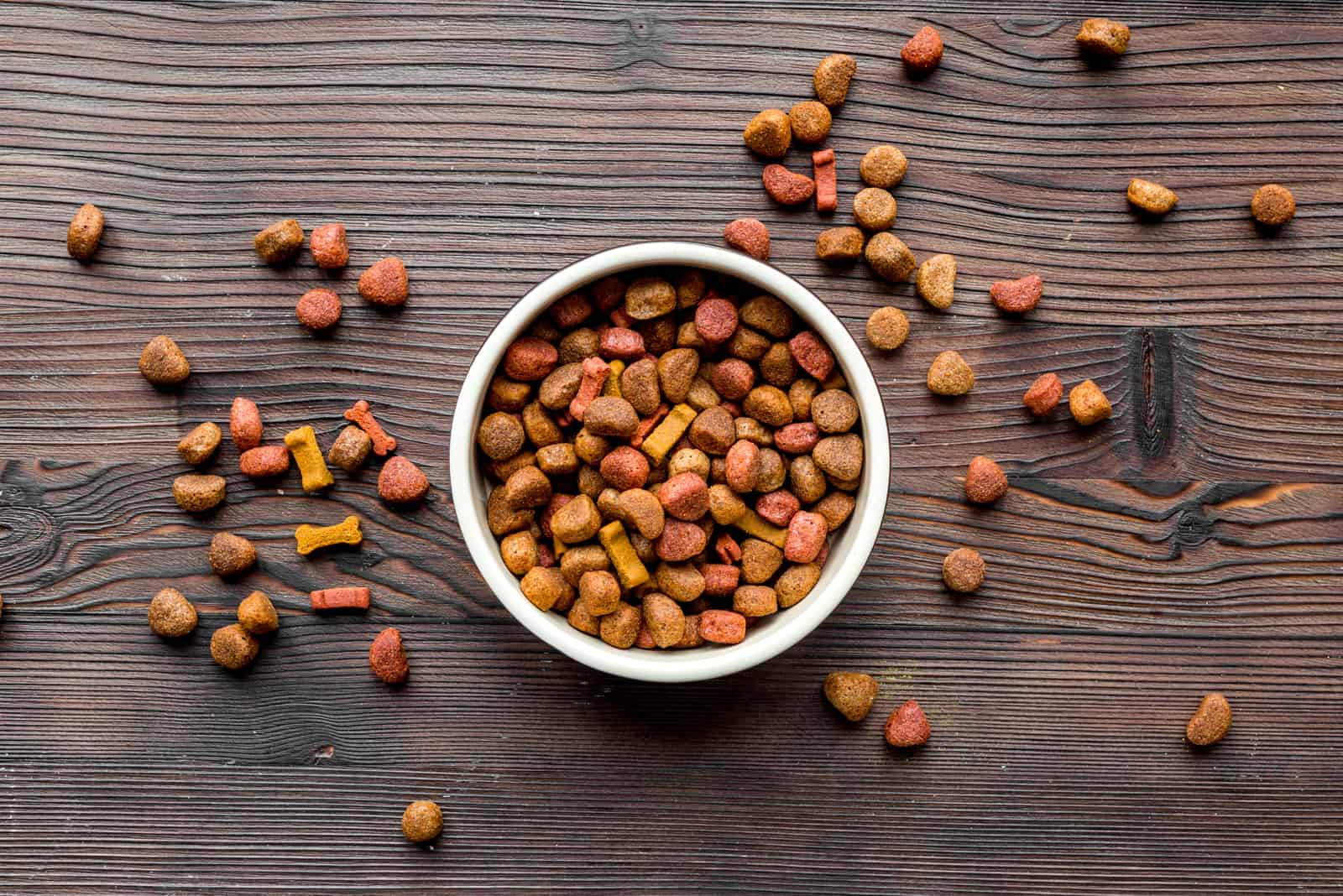
If we want to get into a bit more detail, the food Yorkies normally eat isn’t always the same. There are obvious variations just like with humans, but how and when does that happen?
Here’s a comprehensive list of the meals you should be feeding your Yorkie and how to manage it.
0-2 Weeks Of Age
At this stage, new puppies still have yet to open their eyes or even be aware of anything surrounding them.
This is still the period where his mom is going to be responsible for taking care of him and they should be kept close to her to have access to food whenever they want to.
In this case that’s going to be mother’s milk that’ll provide them with all the necessary nutrients to grow and keep them sated
3 Weeks Of Age
Not much has changed except your Yorkie puppy’s perception of the world and them becoming a little more active.
They remain clumsy and sluggish, but that’s all natural for this period.
You should still stick to letting his mother do the feeding so keep the momma well fed and hydrated so she can keep up with the demand.
It’s best if you let the mom free feed herself for this purpose to help replenish when she needs to.
Though. make sure that the bowl is filled with fresh kibble rather than keeping the stale one in if it ends up remaining in the bowl after the filling prior.
4 Weeks Of Age

Still mostly the same, the puppy’s steps will become more confident, but they’ll still want to be around their mom most of the time for nutrition, warmth and comfort.
Some of the more advanced pups can already be started on weaning off their mother’s milk, but most will still want to remain around her.
The weaning attempts should start off small, especially at this stage by mixing 3 parts of water with one part of food to create a mixture that’s easier for them to stomach and has a similar consistency to the milk they were consuming thus far.
Keep in mind that their digestive system likely hasn’t fully developed yet so expect a lot of rejections to these attempts, in which case you should wait another week before trying again.
5 Weeks Of Age
With your puppy growing to a more independent stage, you can try the weaning process again.
It’s more likely to work, but not guaranteed. It’s also still not a requirement to be done as the mother’s milk will still be doing its work.
You’ll normally have a number of breeders already forcing the issue here just to get them prepped for sale sooner, but if you’re raising them independently, it’s best to just gradually ease them into it.
6 Weeks Of Age
Dogs mature quickly, and by the 6th week, you can try the weaning method from earlier. It should have high chances of success now if offered, and, if successful, you can slowly start helping him adapt to more solid foods.
This is done by slowly changing the ratios of food and water in the mix over time until you finally get them used to solids.
Once you’ve successfully weaned him off mother’s milk, you can freely switch to dry kibble, but keep it down to small meals with more meals per day rather than one big portion.
They’re tiny still so big portions will just end up getting stale and may make them dislike it.
Also, make sure to stick to smaller kibble sizes so they don’t have problems with grabbing the kibble or breaking it down in their mouths.
And make sure to rely on dry rather than wet dog food as the dry stuff helps keep teeth clean by fighting off plaque and tartar.
You may still have some pups who won’t accept the weaning attempts, in which case it’s still business as usual with the mother’s milk.
7 Weeks Of Age
If you still have pups feeding off their mother’s nipple, now would be the time to start forcing the issue a bit more so the momma can finally get a bit of a reprieve and get back to normal.
She’ll help you in this endeavor, of course, by not letting the pups linger around too much around her nipples for feeding time, but you should be the one taking charge.
Those who are on the puppy dog food should continue at their pace, going from 3 to maybe 5 small meals a day depending on their activity level.
Don’t go over the recommended Yorkie puppy feeding schedule as a few calories extra is a lot for small dog breeds, especially puppies and can lead to obesity real quick.
They’ll whine on occasion to try and coax some more food out of you, but remain adamant and practice a little bit of tough love to keep them healthy
8 Weeks Of Age
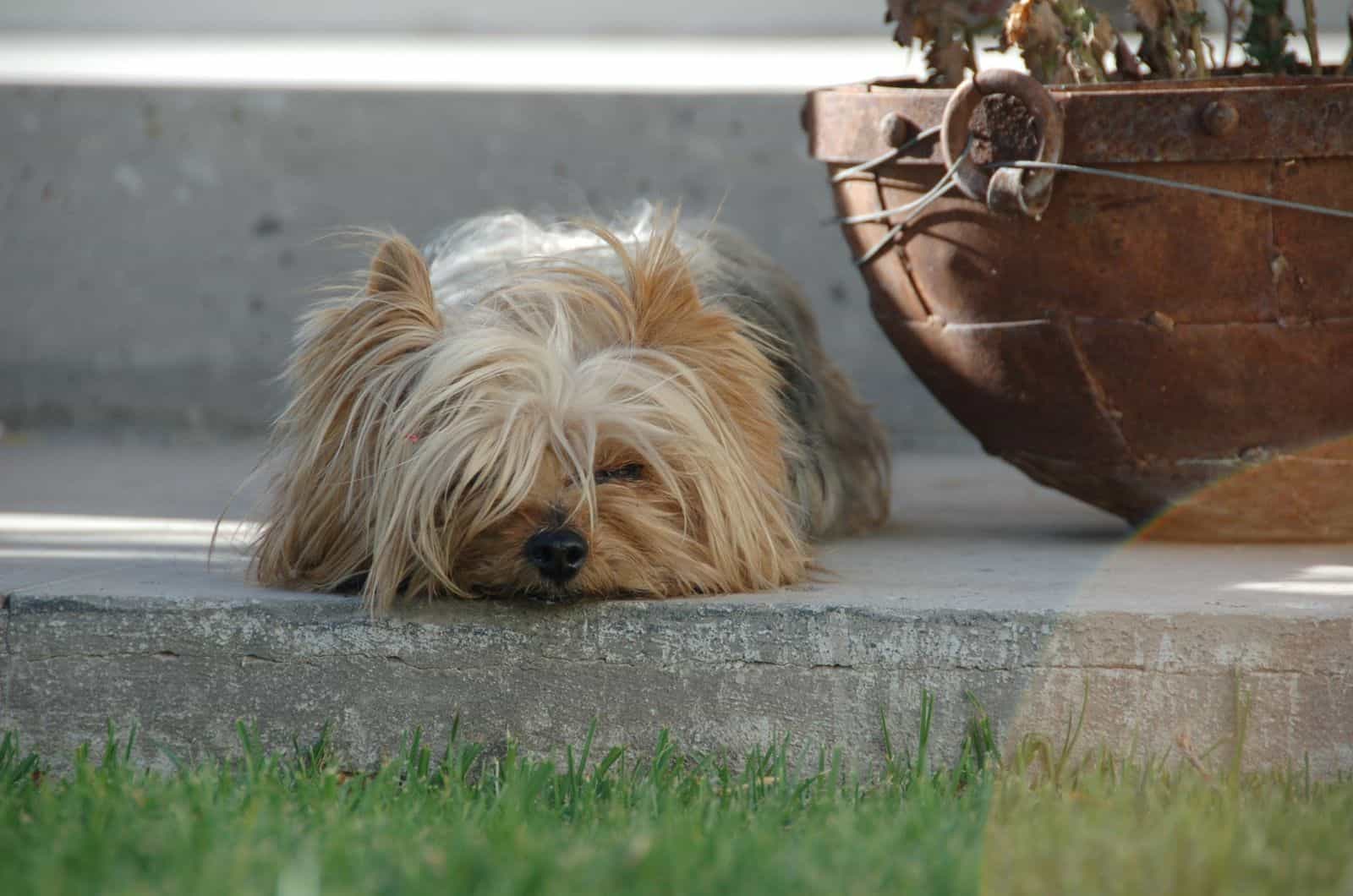
The end of the second month is the big turning point for pups as it’s the age at which they normally get sold to a new family or home which is why it’s important to wean them off mother’s milk before this threshold.
If you don’t, you’ll have a harder time getting them to leave and they may not even want to take any other food.
On the other hand, if you weren’t the one dealing with these 8 weeks and are the one buying the Yorkie pup right now, it’s a good thing to inquire about the type of food that your chosen pup has been eating.
This way you’ll make sure he has a lot less digestive issues and your doggo will be more compliant to feeding times if he’s eating something he’s more familiar with.
You may have him wailing for his mother every now and then, but that’s only natural and usually shouldn’t interrupt his feeding habits.
9 Weeks Of Age
By week 9, your doggo should’ve gotten adapted to his new home and is officially weaned away from mother’s milk.
He would’ve finally moved on to only solid foods and should start shaping up to a more capable and confident dog.
Though it’s wise to slowly start upgrading the food. You don’t have to do it right away and should take it at the dog’s pace much like the weaning process was dealt with, but getting his tummy used to a more diverse diet will help him in the long run.
Try testing what he can and can’t stomach by adding some new food into the mix with the old, one part at first and gradually increasing it if he takes to it well.
10 Weeks Of Age
At this stage, your new pup should be getting used to your new home and calling out for his mother less if at all.
He should be more comfortable around you and in general if you’ve been treating him right.
The meals now should be down between 3 to 4 daily and the daily intake should be an average of a quarter to half a cup of food daily. The food in question being high quality dry kibble as a measurement.
Adjust adequately for caloric intake, of course. If you see him gaining too much weight, make corrections immediately so no health issues start popping up.
Yorkies are a small breed after all, Yorkie pups especially and they won’t really eat an awful lot so you won’t be needing to spend too much money on something exquisite.
11 Weeks Of Age
At this stage, your pupper is likely starting to mature already and is becoming a lot more active around the house and in general.
The period between 10 to 12 weeks is usually the next threshold for Yorkies as they somehow gain sudden bursts of energy.
At this point, you’ll actually need to increase his food intake by a little bit, usually an extra 20%-25% extra, give or take as he’ll be burning through a lot of calories.
He’ll also hit a small growth spurt and his digestive system should be developing further, especially his stomach which will have the capacity to go through that extra bit of food that you’ll be adding to his diet.
Still, make sure you’re not giving him too much or too little, adjust as necessary.
12 Weeks Of Age
This is the point where your doggo is slowly starting to exit that initial puppy stage and is beginning his process of maturing into a more adult dog.
3 months may seem like a small amount of time, but dog years aren’t the same as human years.
He still has a long time to go, another 6-9 months, but the process would’ve already started.
There aren’t many new innovations here except making sure he gets plenty of exercise to adjust to his muscles and to keep him at a healthy body weight for his size.
If you’re unsure of what a healthy weight for him would be, schedule regular check-ups at the vet to track his progress and get advice and insights on adapting his feeding regime adequately.
Getting To The First Year
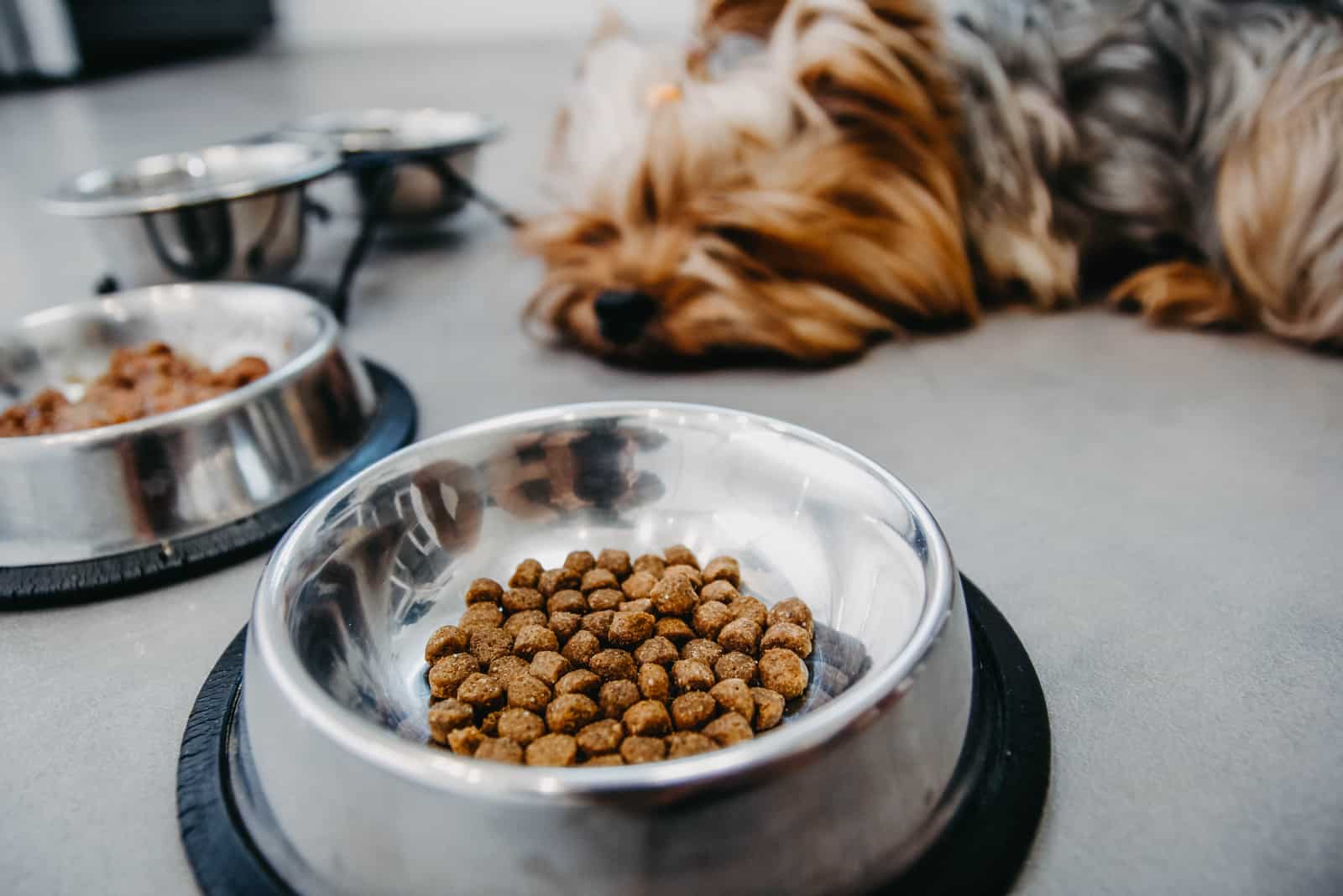
Not much will be different between months 3 to 12 apart from gradually needing to get your dog off puppy food to adult Yorkie food.
Why? Well, the food your pups have been eating is usually higher in calories than food meant for an adult Yorkie and continuing with the same product can lead to obesity which is a serious issue with smaller dogs.
The sooner you’re able to make the switch, the better, though don’t start it off on your own, consult with your dog’s vet or a pet nutritionist on when the right time for it would be for your canine companion.
Once you start, apply the same process you have so far by slowly introducing the new food by mixing it with the old food and gradually increasing the ration until it completely replaces the old option.
Once the Yorkie hits his first year of life, he’d have officially become an adult.
Year 1 To Year 7
Now that your dog has been well adjusted to adult dog food options, you get to introduce him to a variety of different brands and types of food from wet, canned food to treats and dry dog food with dozens of different flavor options.
At this point, his digestive system has long since fully developed and should be able to stomach everything any other Yorkie is able to process.
Keep him away from any dog food no-nos which we’ll get into more a bit later, and make sure that he keeps his ideal weight and doesn’t tread over the obesity line.
As he grows older, you’ll gradually be reducing the amount of food, or rather, the amount of meals that he gets on a daily basis as his metabolism slows down.
Year 7 And Onward
At this stage, your doggo is entering his senior Yorkie years.
He’ll start being less active and will need to eat less as his metabolism continues to slow down which is common for senior dogs.
The amount of food and daily calories needed will decrease at the same time, so make sure to follow along and adjust as needed following the chart above and consulting with your dog’s vet or nutritionist as well.
What About Teacup Yorkies?
Teacup Yorkies adhere to the same methods as regular Yorkies do, the only difference is that a Teacup Yorkie may end up suffering from tooth issues more often and may even end up losing some.
There’s little you can do about that as it’s just a result of poor breeding choices down the line.
How Many Calories Do Yorkies Need Daily?

The amount of daily calories isn’t pre-determined and can vary greatly even with the numbers already mentioned earlier.
What I gave you was an average, but there are so many deciding factors regarding this that can skew the amount greatly.
The Level Of Activity
One of the usual culprits is your dog’s activity.
While Yorkies being sedentary or active won’t make as big a difference in the daily intake as it would for a larger dog breed, it still makes some difference.
For adults, the more sedentary types should get their daily portion reduced to a quarter of a cup.
The more active ones should keep to the half a cup standard with a bit more added in if necessary, but not too much.
Pregnancy
Pregnancy affects a female Yorkie’s daily nutrient needs too given the need to provide enough nutrients for her young.
Some people advise going back to a more calorie-dense diet which involves using puppy dog food instead of the adult stuff as they pack more calories per kg than the standard adult stuff.
The same can be said for when she gives birth to them as she’ll need to keep up with the demand. Allowing her to free feed is usually the best option as she should know her limits at the time.
Make sure she has a full bowl of water and a fresh batch of kibble around at all times.
Don’t top the bowl up, clean the old kibble out as it’s healthier for her.
Spaying Or Neutering Your Dog
Certain events in a dog’s life can also alter these feeding habits, like the need to spay or neuter your Yorkie.
The initial period especially when some level of depression may hit, but it does slow the dog’s hormonal production and metabolism overall, meaning they end up needing less calories in a day.
The difference, once again, isn’t as big as it would be in larger dogs, but it’s still there.
If there don’t appear to be any changes in weight after the procedure, then you can keep it as is, but should your dog start gaining weight, reduce the amount as needed.
Once again, it’s best to consult with a veterinarian about this as they’ll be able to prepare you for the potential changes needed for this process.
A Dog’s Age
One of the more obvious culprits of the bunch that dictate the daily nutrient and calorie requirements and are the basis of a dog’s diet.
Puppies usually go anywhere from 100-200 calories on a daily basis which goes through a rapid increase over the course of a few weeks.
Once he hits his first year of life, this can increase all the way up to 250 calories when he finally hits adulthood and then it slowly starts to decrease back to 200 as he reaches the half-way point of his life.
At age 7 and above, the metabolism starts to gradually slow down and your dog starts becoming less active which ends up reducing the necessary calorie amount per day all the way down to 130 for the most sedentary of Yorkies.
Part of it is the weight gain, but the other part that also ties into it are the varying number of health issues that can pop up from being obese and overweight.
How Can I Calculate How Many Calories My Dog Needs?
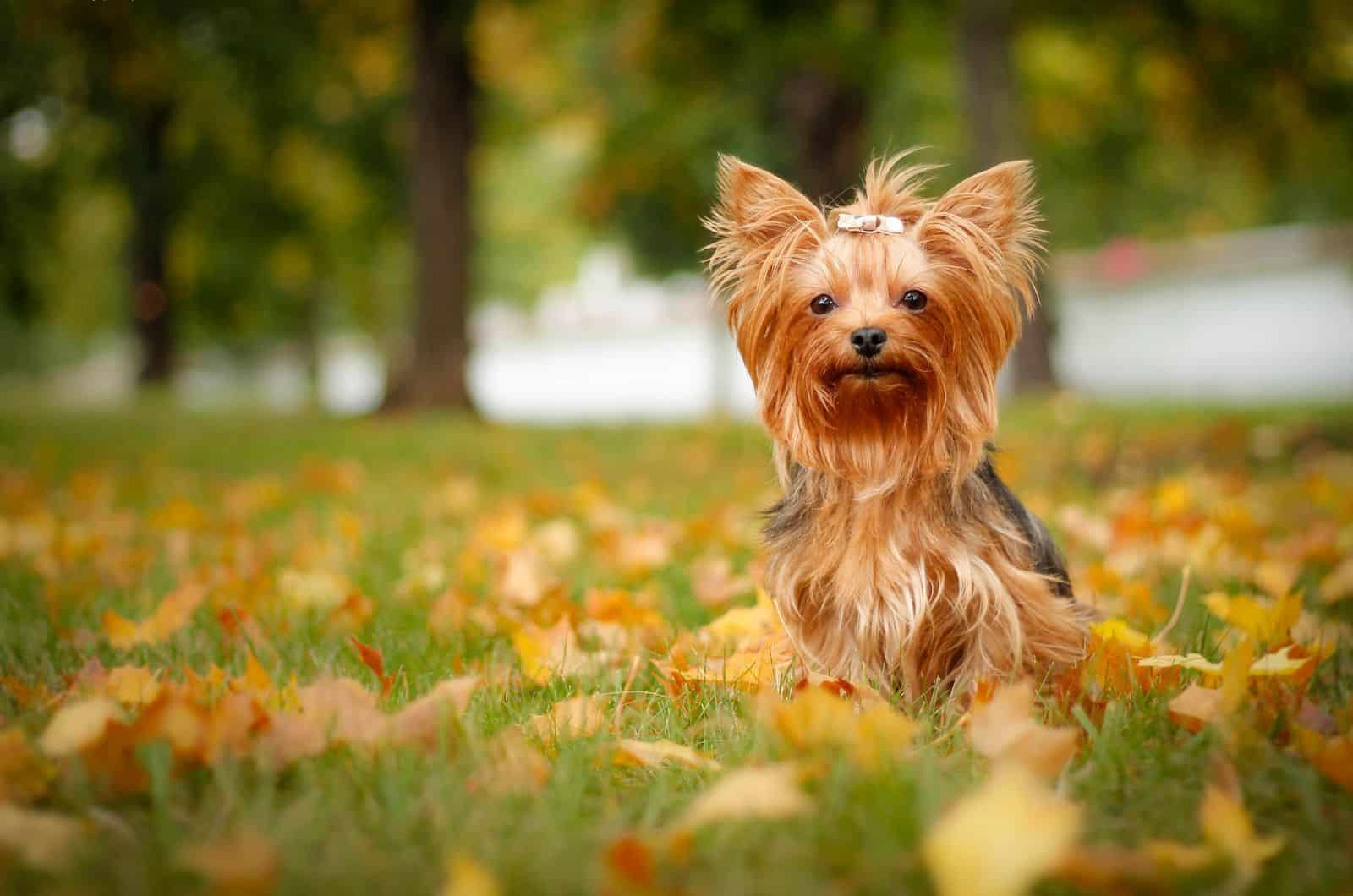
There’s a process called the RER method also known as Resting Energy Requirement.
There are formulas for medium and large or small dog breeds, and, in our case, we want to use the latter.
The latter takes the dog’s weight in kilograms and puts it in this formula:
70 x body weight in kilograms to the ¾ power = RER for small/large patients
This gives us a rough estimate on how many calories our furry friend needs to take in on the daily.
That said, I still advise not blindly trusting it and fine tuning it yourself based on practical results.
What Food Should My Yorkie Eat?
Yorkies tend to enjoy a somewhat diverse diet and aren’t the pickiest of eaters.
The Right Protein
That said, you’ll want to include some form of meat in the mix, some form of beef, chicken or turkey are usually the best options.
You can use fish too, but it’s less favored than the other options.
Supplement With Fiber
And the food is always made better if it has something to supplement it. Brown rice is usually the best option as it provides a good source of fiber for easier digestion and helps keep satiety levels up.
No Meat By Products Or Fillers
Also, steer clear of meat by-products or fillers like turkey or chicken meals if you can as it’s mostly used to inflate calorie counts which isn’t something you need for a small dog breed like the Yorkie.
Needs Some Fats
While you do want high protein options, Yorkies still require a decent bit of fat too, anywhere within the 17% to 23% range, give or take a few percent.
Limit Digestible Carbs
The best dog food options for them also tend to limit carbs given how small and toy breeds of dogs have issues with regulating blood sugar and hypoglycemia in general.
All The Vitamins And Nutrients
You’ll want all natural ingredients as well as plenty of nutrients, minerals and vitamins to fulfill their daily nutritional needs. Things like berries, sweet potatoes and other fruits and veg are often the best sources.
You’ll especially want to find food that provides your canine companion with some omega-3 fatty acids as they’re a key nutrient for any dog breed to help maintain skin and coat health as well as aiding joint health to a degree.
Grain-Free For Allergy Prone Yorkies
If you have a dog prone to allergies or with a sensitive stomach, a good bet is to find something that’s grain free, meaning no presence of soy, wheat, corn, or even gluten for that matter.
Smaller Kibble Size
Standard kibble sizes are intended for medium dog breeds. For Yorkies and other smaller breeds, find dog food with smaller pellets that won’t be a chore for your dog to pick up and break down in his mouth.
No Artificial Ingredients Or Additives
And, naturally, you want to avoid GMOs as much as possible as well as any artificial stuff like various preservatives, colors, flavors or any other harmful chemicals detrimental to your Yorkie’s health.
Is Wet Dog Food Better Than Dry Dog Food?
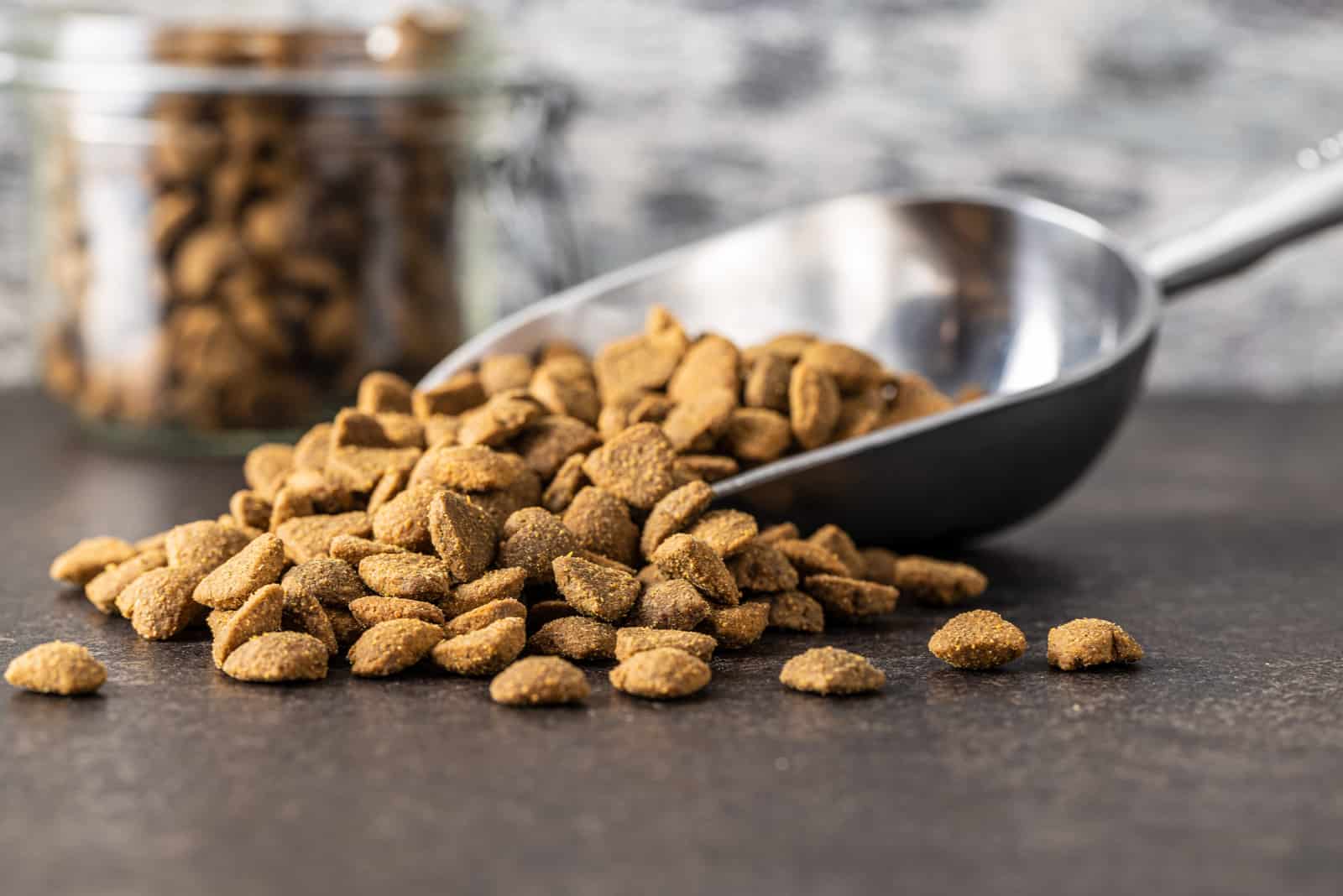
You’ll want to primarily use dry dog food for feeding your dog as it’s much better for their teeth and usually helps fight off tartar and plaque.
Wet dog food does the opposite and usually tends to stick between his teeth or stain them.
That doesn’t mean that you shouldn’t use both though.
Stick with the dry stuff as the primary source, but sprinkle in some of the wet stuff every now and then to give your doggo a more succulent food experience.
Where Can I Get The Right Food?
Your local stores or supermarkets should be well stocked with a few options, but the selection isn’t all that great.
The best dog food for Yorkshire Terriers is usually found on online marketplaces like Chewy Or Amazon, so I’d head there, personally.
Food You Should Absolutely Avoid Feeding Your Dog

While Yorkies can enjoy a diverse diet, there are several items that no dog should ever consume, regardless of breed as they can cause more than just an upset stomach. Most of them are toxic to dogs and potentially fatal.
You’re likely aware of a few of these, but I still wanted to give you a proper rundown:
• Xylitol – A sweetener that’s found in most candies and chewing gum and should be avoided at all costs as it can lead to liver failure
• Alcohol – An obvious pick, but one people don’t pay much attention to. This doesn’t just include drinks, but any foods infused with alcohol like various steaks.
• Chocolate – The most infamous dog poison that can cause severe issues like heart problems or death. The main problem is a substance called Theobromine which is found in almost every chocolate
• Caffeine – Another notorious problem substance, one that’s found in almost every snack and is often fatal for dogs, even in small amounts
• Avocadoes – Yes, one of the so-called superfoods is a problem for your dog due to a substance called Persin which can get stuck in their intestines and cause an obstruction, often leading to a fatal outcome
• Garlic and onion – The favored seasoning in almost every human dish is poisonous to dogs. While not as fatal as some others, it can make your dogs anemic
• Spicy foods – Another obvious case. Dogs simply can’t handle spicy foods. The capsaicin is even more damaging to them than it is to a human and can lead to various problems that’ll lead to a mandatory vet intervention
• Raisins and grapes – There are plenty of other fruits to get your dog, these aren’t it as they can cause sickness and even kidney failure in some extreme cases. Steer clear
What About Food Supplements?
While normally it’s ideal to have all the nutrients in the food you’re already giving your Yorkie, if for some reason you aren’t able to find the right balance without them, you can absolutely include supplements in your dog’s diet.
This is also true for any dog that, due to a deficiency or some other health issue, needs said supplements to make up what he has lost.
They’re by no means dangerous and are usually helpful, though they may exert some extra strain on your budget, so do be wary of that.
The best way to get these supplements in is either through various dog treats or if you can slip them into his regular food without him noticing.
What Happens If Your Yorkie Refuses To Eat?

If you see your dog not eating his standard amount for whatever reason or simply refusing to eat, it’s likely not you that’s the cause.
He may simply be suffering from a different potential number of issues.
Usually it’s an upset stomach or just a lack of appetite from being sick. It could also be a result of you trying to force a new brand of dog food too quickly, one that he hasn’t adjusted to quite yet.
Should this be a consistent issue, it may be wise to get him to a veterinarian for a check-up so you can get to the root of the issue and hopefully find ways to fix it.
And you’ll want to because lack of appetite and not eating enough are going to cause a series of different problems down the line.
Being underweight is only the precursor for potential depression, lack of nutrients, growing sickly, contracting various digestive issues and even frequent vomiting among others.
In Conclusion
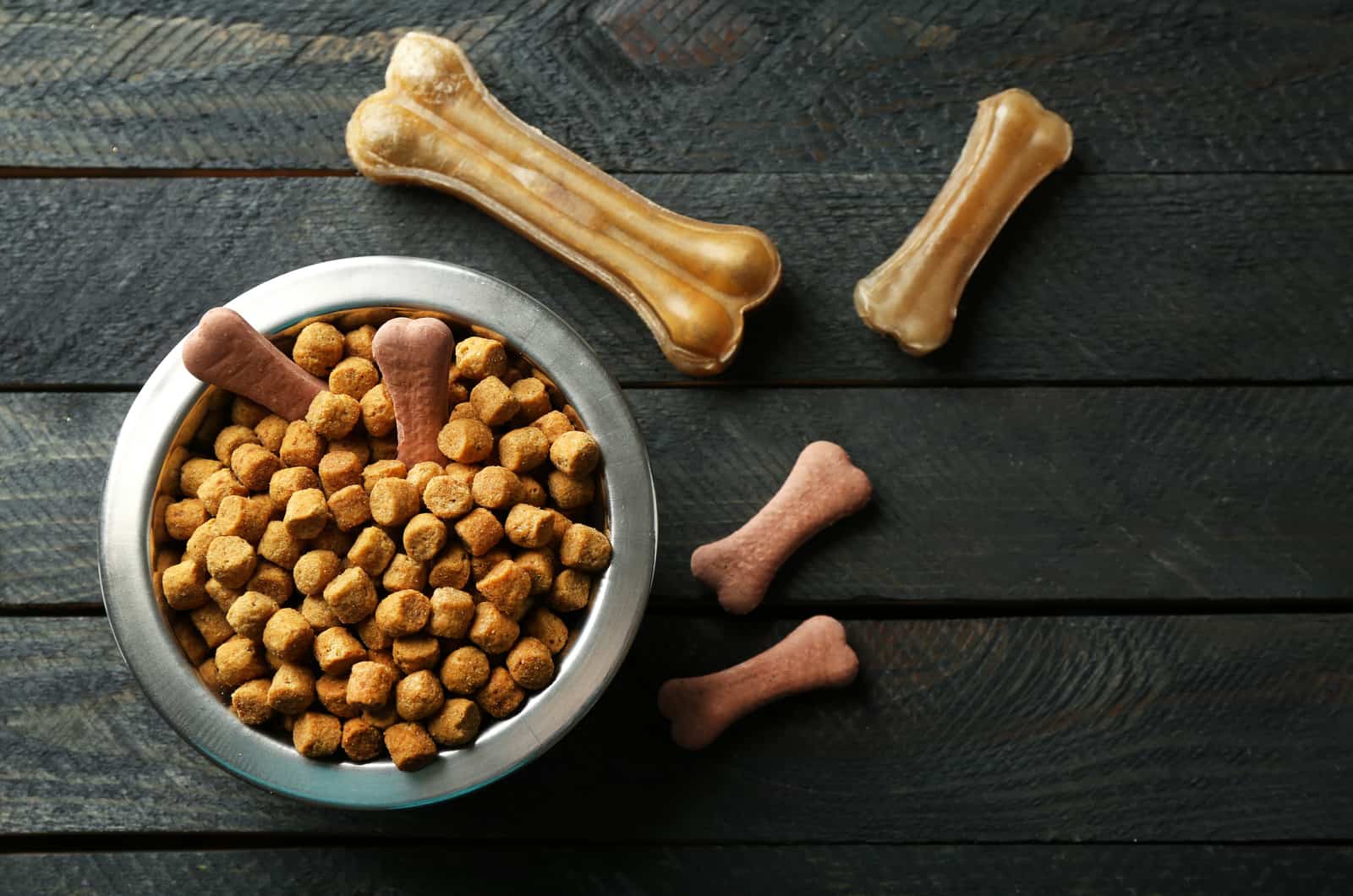
A Yorkie feeding chart helps provide a form of guideline, something to base your own Yorkshire Terrier’s diet and feeding guide on.
Since every dog is unique, you’ll need to fine tune it to get the best results for your own Yorkie.
While you can do it yourself, I advise you to seek help from a veterinarian, a pet nutritionist or any other certified professional.
It may be tough to keep it up, but I trust that you can do it. Until next time.
RELATED LINKS:
• 8 Yorkie Colors: Let’s Meet These Puppy Fashionistas!
• Best Dog Food For Yorkies – 17 Products You Have To Try!
• How Much Do Yorkies Cost? Yorkshire Terrier Costs Explained
• Female Yorkie Vs. Male Yorkie: Which Is The Best To Own?
